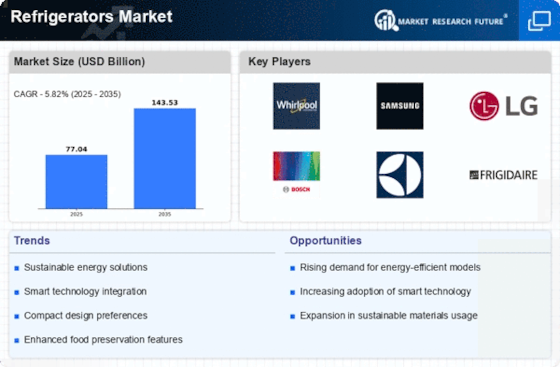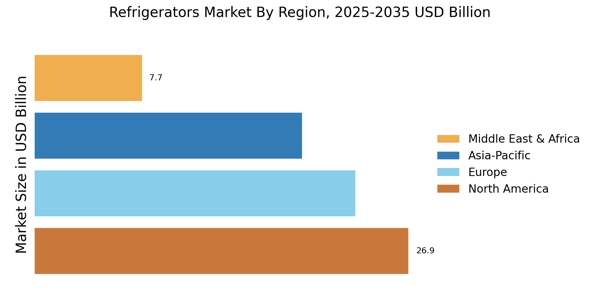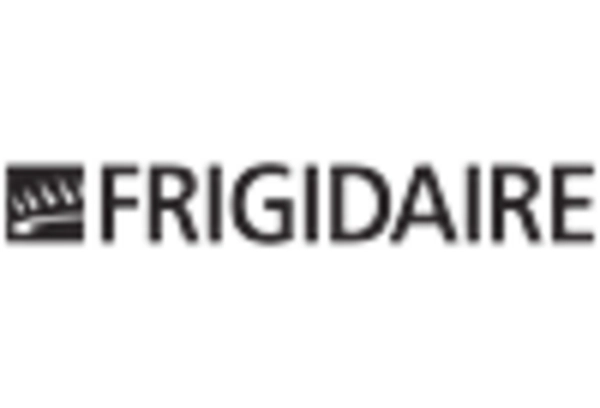Health and Food Safety Awareness
The growing emphasis on health and food safety is influencing consumer choices in the Refrigerators Market. As individuals become more health-conscious, the need for proper food storage solutions has intensified. Refrigerators Market that offer advanced cooling technologies and features such as humidity control and separate compartments for different food types are increasingly sought after. Market data suggests that consumers are willing to invest in higher-quality refrigerators that ensure food safety and prolong shelf life. This trend indicates a potential shift in purchasing behavior, where consumers prioritize health-related features in their refrigeration choices, thereby impacting the overall dynamics of the Refrigerator Market.
Urbanization and Changing Lifestyles
Urbanization is a significant driver of the Refrigerators Market, as more individuals migrate to urban areas where space is often limited. This demographic shift leads to a demand for compact and multifunctional refrigerators that can fit into smaller living spaces while still providing essential features. Additionally, changing lifestyles, including an increase in single-person households and busy lifestyles, contribute to the need for efficient refrigeration solutions. Market analysis shows that the demand for compact refrigerators is on the rise, with a projected growth rate of approximately 8% annually. This trend indicates that manufacturers must adapt their product lines to cater to the evolving needs of urban consumers in the Refrigerator Market.
Technological Advancements in Refrigeration
Technological innovations are reshaping the Refrigerators Market, with smart refrigerators gaining traction among consumers. These appliances often feature Wi-Fi connectivity, touch screens, and advanced temperature control systems, enhancing user convenience and food preservation. The integration of IoT technology allows for remote monitoring and management, which appeals to tech-savvy consumers. Market data indicates that the smart refrigerator segment is expected to grow at a compound annual growth rate of over 10% in the coming years. This trend suggests that manufacturers who invest in advanced technology may capture a larger share of the Refrigerators Market, as consumers increasingly prioritize functionality and connectivity.
Sustainability Initiatives and Eco-Friendly Products
Sustainability initiatives are becoming a focal point in the Refrigerator Market, as consumers and manufacturers alike prioritize eco-friendly products. The demand for refrigerators made from sustainable materials and those that utilize environmentally friendly refrigerants is on the rise. Manufacturers are increasingly adopting practices that reduce their carbon footprint, which resonates with environmentally conscious consumers. Industry expert's indicates that eco-friendly refrigerators are expected to capture a larger market share, as consumers are more inclined to support brands that align with their values. This trend suggests that sustainability will play a crucial role in shaping the future of the Refrigerators Market, influencing both product development and consumer purchasing decisions.
Rising Consumer Demand for Energy-Efficient Appliances
The increasing awareness regarding energy consumption and its environmental impact appears to drive the Refrigerators Market. Consumers are increasingly seeking energy-efficient appliances that not only reduce electricity bills but also contribute to sustainability efforts. According to recent data, energy-efficient refrigerators can consume up to 50% less energy than traditional models. This shift in consumer preference is likely to encourage manufacturers to innovate and produce more energy-efficient models, thereby expanding their market share. As a result, the Refrigerator Market is witnessing a surge in demand for products that meet these energy standards, which may lead to a significant transformation in product offerings.

















